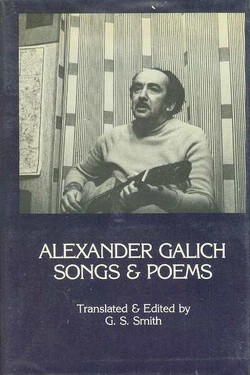When Galich performed, his presence – the way he sat in his chair, held his guitar, put forward or withdrew his knee – his pauses, shifts of inflection, and projections were all nuances of an accomplished acting technique and part of the performance. His audiences were packed tensely into a small apartment with a lookout stationed in the corridor. Having witnessed such a performance in Moscow in the spring of 1974, I felt I had experienced something momentous, powerful, overwhelming. I had been listening not simply to a very adroit actor-singer-composer-lyricist, but to a generation casting off its chains. Much of the effect depended on the time and place, mood and circumstances. Yet I felt then, as I no longer feel, that it was in some sense reproducible, and that when Galich sang, “Kogda ia vernus’,” in one way or another he would return, that his songs were immortal and that they would wake the dead.
But they have not traveled well. The melodies, as Gerald Smith rightly points out, unlike Bulat Okudzhava’s, are not memorable in themselves, and Galich’s guitar techniques were fairly rudimentary. His poem-songs, even when read in the original – stark on the page – do not convey the passionate depths over which they trembled in performance. Even his last performance at the Venice Biennale in December 1977, excellent as it was, fell far short of the one I had heard in Moscow before he had emigrated. Sitting on an elevated stage before footlights, Galich seemed not the same, but a lesser figure. I felt the same about “A Whispered Cry,” the record he cut in Norway. What Gerald Smith has undertaken in this book, therefore, strikes me as both a noble and a hopeless task.
The introduction is scrupulously and accurately informative, and the translation is painstaking, although one sometimes feels that the wrong pains have been taken. Smith has an excellent command of contemporary colloquial Russian, and he is an expert on Russian metrics. But having made “singability” the first value of his critical hierarchy, he inevitably loses nuance and power. Unfortunately, lines with a tormented syntax that belies the colloquial lexicon, like “But she those nasty car drivers / Must curse the whole day through <…>” are not too singable either; but not many are quite as bad. The idiom is British, not American English. Smith tends to be both accurate and inventive. He has included the music for two of the songs as a kind of appendix. And there are useful, if somewhat sketchy, notes. It is a labor of love and commendable. But it is not Galich. Whether there can be “Galich” in cold print between covers is another question.
SIDNEY MONAS
University of Texas at Austin






